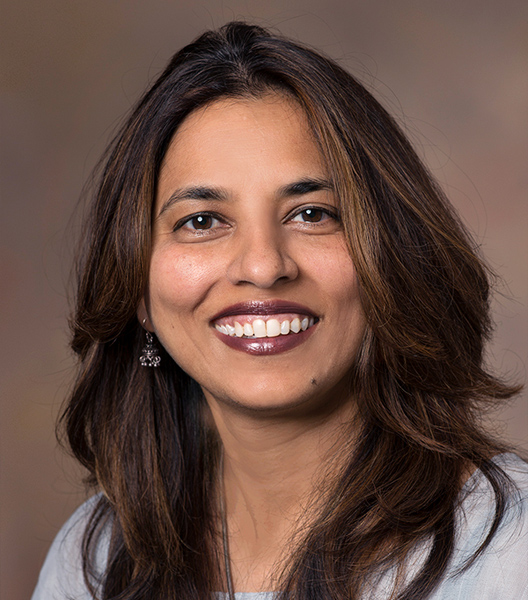National Institute on Aging Funds Study to Understand Effects of Yoga Practice on Health Among the Elderly
Purnima Madhivanan, MBBS, MPH, PhD, an associate professor in the Department of Health Promotion Sciences at the University of Arizona Mel and Enid Zuckerman College of Public Health, will study Senior Yoga as an intervention to reduce cumulative health problems among the elderly. Dr. Madhivanan received a National Academy of Medicine (NAM) Catalyst Award research grant award from the National Institute on Aging (NIA) in the amount of $143,696 for her two-year study titled “Yoga for Healthy Aging (YHA) Study: A Mind-Body Intervention to Reduce Multimorbidity In the Elderly.”
This grant falls under the NIA RFA “Innovations to Foster Healthy Longevity in Low-Income Settings.” Catalyst award winners have the opportunity to participate in future NAM activities to support the development of their research or programs. Dr. Madhivanan’s research seeks to adapt an evidence-based yoga lifestyle program, Senior Yoga, for primary care settings in India, and implement it in the future with a local population in Tucson, Arizona. Senior Yoga was developed to address the physical and mental needs of seniors aged 60-80 years.
The aging adult population is rapidly growing around the world, a demographic shift that places significant pressure on healthcare systems in both developed and developing countries. The number of people aged 60 years or older is estimated to increase from 900 million in 2015, to 2.1 billion by 2050. Almost a fourth of the global burden of disease arises in in older people; and chronic conditions are increasingly concentrated in the elderly in low- and middle-income countries. Since almost half of the lifetime costs for medical services are incurred after 65 years of age—healthcare systems face huge and increasing financial burdens related to cumulative health problems in the elderly.
Current intervention approaches are poorly suited to older patients with multiple, co-occurring, and inter-related conditions (multimorbidity). Multimorbidity is commonly manifested in frailty, impaired cognition, incontinence, and balance disorders that present significant challenges for effective intervention. Comprehensive and holistic approaches that improve both physical health and subjective well-being are best suited for this population. Seniors Yoga, a form of yoga tailored to be safe, gentle, and helpful for the elderly, represents a promising strategy for addressing multimorbidity in this population. It has been recommended as a healthy aging strategy in the Go4Life campaign from the National Institute of Aging. Yoga, a mind-body practice with origins in ancient Indian philosophy, combines physical postures, breathing techniques, meditation, and relaxation.
The proposed research fits with the priorities of the National Institute of Aging, which includes gaining a “better understanding of interventions that reduce the burden on family caregivers to improve the health of the aging care recipient.” There are currently no evidence-based implementation models for integration of yoga practice for seniors in primary health care programs that serve low resource communities. The results from this study will help plan an R34 application that will provide early stage feasibility data for a larger randomized controlled trial.
“This will be an important initial study of a yoga intervention that is culturally appropriate for the elderly population in India,” said Dr. Madhivanan, “in the future, we hope to see if similar interventions can be adapted for our elderly population here in Arizona, and to then expand into a larger study. Senior Yoga shows real promise as a low-cost intervention to improve the health of our aging population.”

Purnima Madhivanan MBBS, MPH, PhD
Biography: Purnima Madhivanan, Associate Professor with Tenure in the Mel and Enid Zuckerman College of Public Health, holds joint appointments in the UArizona College of Medicine, the Bio5 Institute, and is also a member of the UA Cancer Center. She completed her medical training in India and received her MPH/PhD in Epidemiology from the University of California Berkeley. She is the Director of the Global Health Equity Scholars Fellowship program funded by the NIH.
For the past 20 years, her work has focused on disadvantaged populations, studying the dynamics of poverty, gender, social and environment determinants of health, with a particular focus on women and children living in rural communities. She established a clinic in Mysore, India in 2005 while completing her PhD dissertation. For over a decade, the PHRII/Prerana Women’s Health Initiative clinic has delivered low-cost, high-quality reproductive health services to 52,000 low-income women living in Mysore District. Offering a full-service clinic, molecular laboratory and active affiliations with several major tertiary care hospitals, the site is recognized as a research and training site for Global Health.
Dr. Madhivanan serves as an advisor to a number of state departments of Public Health, non-profit as well as governmental research organizations. In 2007, she received the prestigious International Leadership Award from the Elizabeth Glaser Pediatric AIDS Foundation for her work on HIV prevention. Dr. Madhivanan’s global health credentials and clinical service has brought unique opportunities for collaboration; most recently benefiting students and faculty interested in learning about Global Health and service in a developing world setting.

